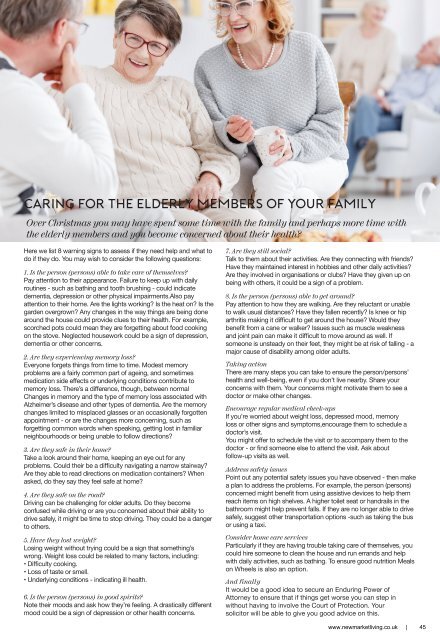Newmarket and Ely Living Dec 2019 - Jan 2020
The fantastic festive issue is here, packed with local events, Christmas fun, delicious recipes, chef Michael Caines plus travel to Oman and advice on buying a new home.
The fantastic festive issue is here, packed with local events, Christmas fun, delicious recipes, chef Michael Caines plus travel to Oman and advice on buying a new home.
Create successful ePaper yourself
Turn your PDF publications into a flip-book with our unique Google optimized e-Paper software.
Caring for the elderly members of your family<br />
Over Christmas you may have spent some time with the family <strong>and</strong> perhaps more time with<br />
the elderly members <strong>and</strong> you become concerned about their health?<br />
Here we list 8 warning signs to assess if they need help <strong>and</strong> what to<br />
do if they do. You may wish to consider the following questions:<br />
1. Is the person (persons) able to take care of themselves?<br />
Pay attention to their appearance. Failure to keep up with daily<br />
routines - such as bathing <strong>and</strong> tooth brushing - could indicate<br />
dementia, depression or other physical impairments.Also pay<br />
attention to their home. Are the lights working? Is the heat on? Is the<br />
garden overgrown? Any changes in the way things are being done<br />
around the house could provide clues to their health. For example,<br />
scorched pots could mean they are forgetting about food cooking<br />
on the stove. Neglected housework could be a sign of depression,<br />
dementia or other concerns.<br />
2. Are they experiencing memory loss?<br />
Everyone forgets things from time to time. Modest memory<br />
problems are a fairly common part of ageing, <strong>and</strong> sometimes<br />
medication side effects or underlying conditions contribute to<br />
memory loss. There’s a difference, though, between normal<br />
Changes in memory <strong>and</strong> the type of memory loss associated with<br />
Alzheimer’s disease <strong>and</strong> other types of dementia. Are the memory<br />
changes limited to misplaced glasses or an occasionally forgotten<br />
appointment - or are the changes more concerning, such as<br />
forgetting common words when speaking, getting lost in familiar<br />
neighbourhoods or being unable to follow directions?<br />
3. Are they safe in their home?<br />
Take a look around their home, keeping an eye out for any<br />
problems. Could their be a difficulty navigating a narrow stairway?<br />
Are they able to read directions on medication containers? When<br />
asked, do they say they feel safe at home?<br />
4. Are they safe on the road?<br />
Driving can be challenging for older adults. Do they become<br />
confused while driving or are you concerned about their ability to<br />
drive safely, it might be time to stop driving. They could be a danger<br />
to others.<br />
5. Have they lost weight?<br />
Losing weight without trying could be a sign that something’s<br />
wrong. Weight loss could be related to many factors, including:<br />
• Difficulty cooking.<br />
• Loss of taste or smell.<br />
• Underlying conditions - indicating ill health.<br />
6. Is the person (persons) in good spirits?<br />
Note their moods <strong>and</strong> ask how they’re feeling. A drastically different<br />
mood could be a sign of depression or other health concerns.<br />
7. Are they still social?<br />
Talk to them about their activities. Are they connecting with friends?<br />
Have they maintained interest in hobbies <strong>and</strong> other daily activities?<br />
Are they involved in organisations or clubs? Have they given up on<br />
being with others, it could be a sign of a problem.<br />
8. Is the person (persons) able to get around?<br />
Pay attention to how they are walking. Are they reluctant or unable<br />
to walk usual distances? Have they fallen recently? Is knee or hip<br />
arthritis making it difficult to get around the house? Would they<br />
benefit from a cane or walker? Issues such as muscle weakness<br />
<strong>and</strong> joint pain can make it difficult to move around as well. If<br />
someone is unsteady on their feet, they might be at risk of falling - a<br />
major cause of disability among older adults.<br />
Taking action<br />
There are many steps you can take to ensure the person/persons’<br />
health <strong>and</strong> well-being, even if you don’t live nearby. Share your<br />
concerns with them. Your concerns might motivate them to see a<br />
doctor or make other changes.<br />
Encourage regular medical check-ups<br />
If you’re worried about weight loss, depressed mood, memory<br />
loss or other signs <strong>and</strong> symptoms,encourage them to schedule a<br />
doctor’s visit.<br />
You might offer to schedule the visit or to accompany them to the<br />
doctor - or find someone else to attend the visit. Ask about<br />
follow-up visits as well.<br />
Address safety issues<br />
Point out any potential safety issues you have observed - then make<br />
a plan to address the problems. For example, the person (persons)<br />
concerned might benefit from using assistive devices to help them<br />
reach items on high shelves. A higher toilet seat or h<strong>and</strong>rails in the<br />
bathroom might help prevent falls. If they are no longer able to drive<br />
safely, suggest other transportation options -such as taking the bus<br />
or using a taxi.<br />
Consider home care services<br />
Particularly if they are having trouble taking care of themselves, you<br />
could hire someone to clean the house <strong>and</strong> run err<strong>and</strong>s <strong>and</strong> help<br />
with daily activities, such as bathing. To ensure good nutrition Meals<br />
on Wheels is also an option.<br />
And finally<br />
It would be a good idea to secure an Enduring Power of<br />
Attorney to ensure that if things get worse you can step in<br />
without having to involve the Court of Protection. Your<br />
solicitor will be able to give you good advice on this.<br />
www.newmarketliving.co.uk | 45


















